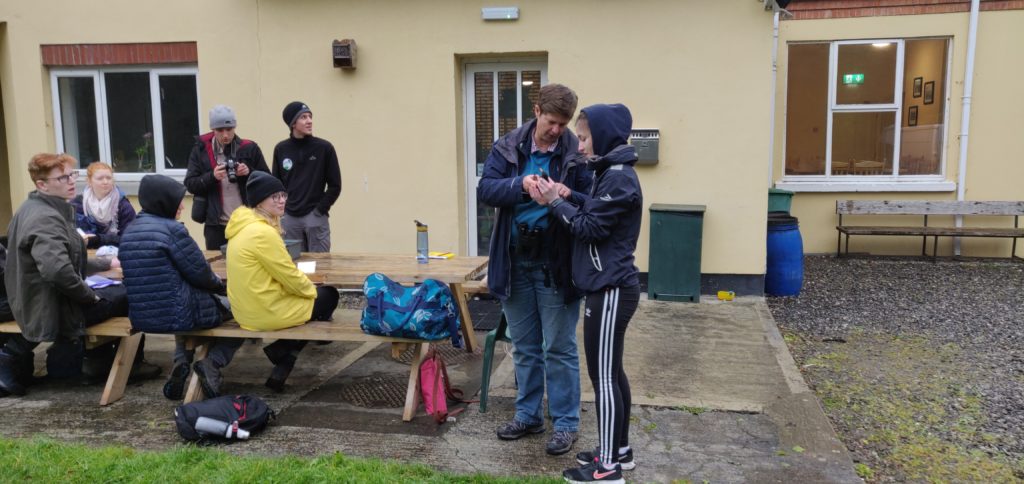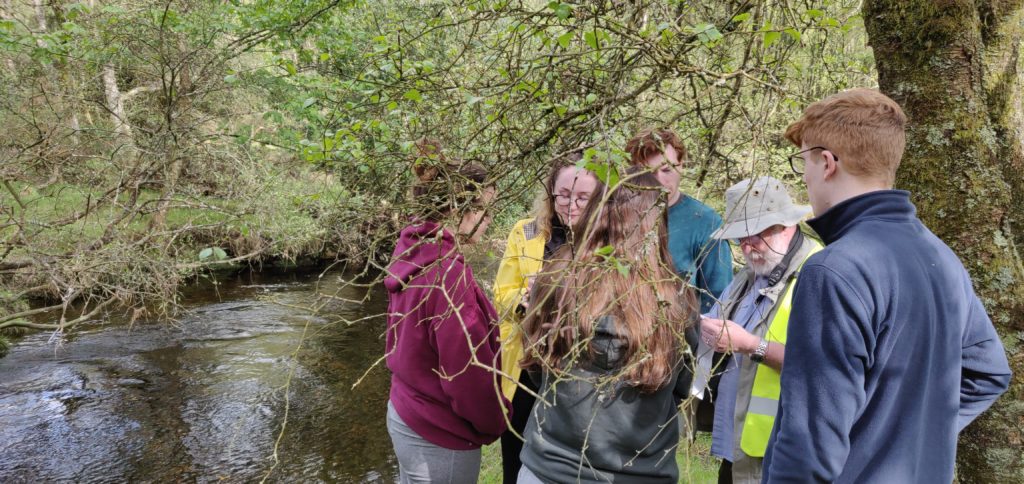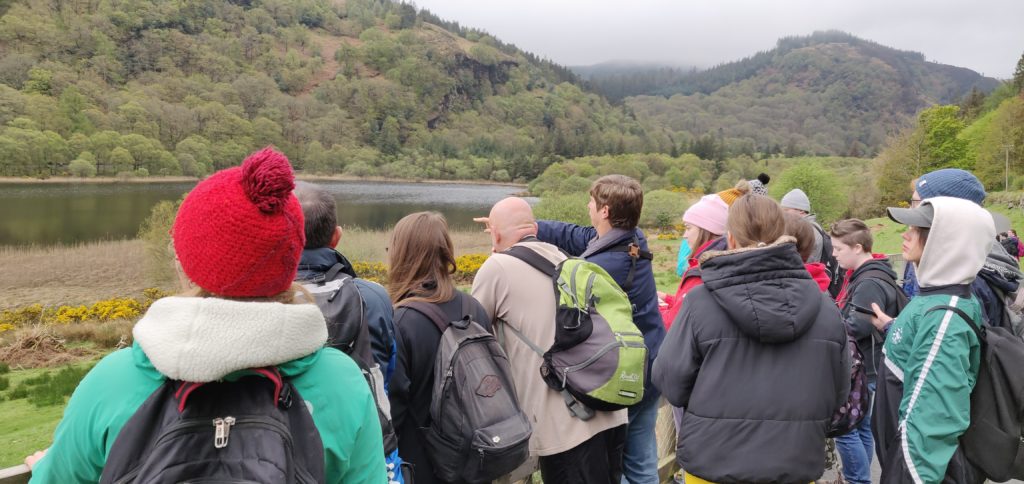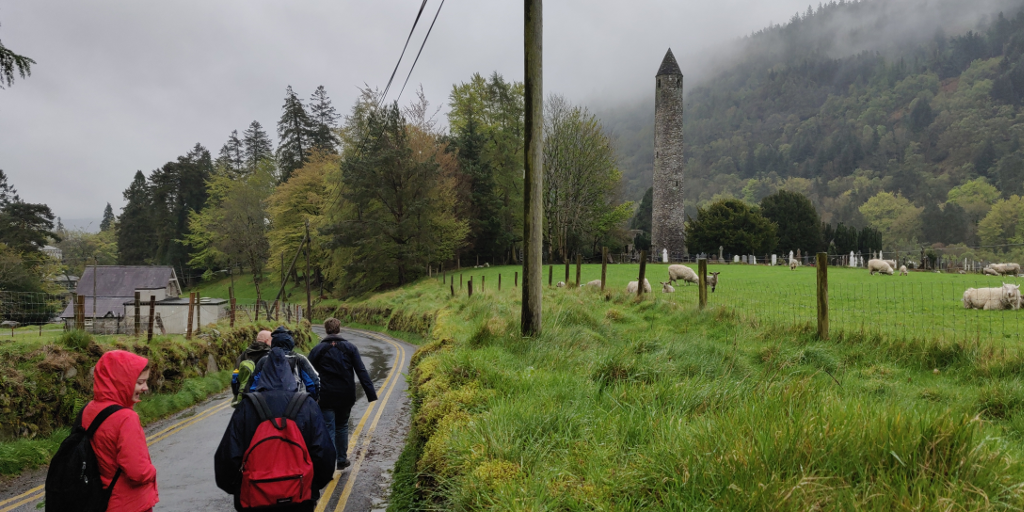I recently took part in the 3rd year Terrestrial Ecology field course in Glendalough. Though I already had some experience teaching both lab work and fieldwork, this was my first time being “staff” on a trip I had previously been on as a student. It was a wonderful experience. This field course is a venerable institution of the Zoology Department: it has taken place Glendalough every year since 2007, having previously been held in the Burren and Killarney National Park. It has always been beloved by students, as seen in this video made in 2016.
Zoology students in Trinity have the chance to take part in three field courses: Terrestrial Ecology in Glendalough, Marine Biology on the rich shores of Strangford Lough, and Tropical Ecology around the ancient Rift Valley Lakes of Kenya. Here, from enthusiastic and experienced teachers, they learn skills that will stand to them in any ecological undertaking. On the Glendalough field course, students of both Zoology and Environmental Science are introduced to the techniques used to sample and survey wild animals, including Longworth trapping for small mammals, malaise trapping for flying insects, kick-sampling for aquatic invertebrates, and mist netting for birds. This last one was what brought me on the course.

Learning about, and from, nature
As a Trainee BTO bird ringer, I helped my PhD supervisor Prof Nicola Marples show the students this fascinating way of interacting with wildlife, which I had no idea existed until I was shown it during my own undergrad, and which has since become for me an important interest and skill. We also teach them the use of focal sampling and point counts to survey birds, and with it a crash course in identifying Irish birds by their song. Whether or not the student ever takes part in another point count, they will take home with them a new understanding of this everyday sound. No matter what path a Zoology graduate goes down in their life, if they ever again hear a robin or a wren singing its tiny heart out and find themselves able to recognise the singer, then their zoological education has benefitted them.
With its oak woodland and historic monastic settlement, Glendalough is an ideal place to appreciate and study nature. Like St Kevin and his blackbird, or the Scribe in the Woods in the 9th century Irish poem, students on the course get to feel the “tucked neat head and claws” of birds and listen to the “fluting bird-throng” of the dawn chorus. The science gleaned from these animals is cutting-edge, but their capacity for inspiration is evidently centuries old.

Biology is by no means the only subject that benefits enormously from field studies. A geologist would say the same about learning to identify rocks and landscape formations– once you know your granite from your limestone, a walk on a rocky beach is never the same again. Even outside of the natural sciences, the TCD Prospectus is full of students and staff singing the praises of field trips, in subjects as diverse as History of Art, Social Studies, and Ancient and Medieval History. It is clear that not only is learning in the field important for a full understanding, but that field trips are key in a course’s appeal to prospective students. Without them, courses might have a difficult time attracting students, and the experience they offer would undoubtedly be less. Not everyone who graduates from Art History will be an art historian, any more than all Zoology graduates will work as zoologists. But anyone can benefit from viewing the great works of art, or from looking at nature up close. In short, from seeing some of the world in person, not just in books or lectures.

The Future of Fieldwork?
No one could doubt the benefit of fieldwork, but institutions are increasingly focused on their costs. American schools point to financial costs as the reason for cutting down on field trips. Penn State disbanded its 98-year-old Outing Club after a review decided its student-led hiking trips were too dangerous. Students fought to keep their club going, but are still barred from organising overnight trips. A 2012 study found that British geology students were undertaking as much fieldwork as they had been previously, but that many overnight trips had been replaced with day trips. Even research is affected: since the 1980s, fieldwork-based conservation publications have decreased by 20%, and the most highly cited conservation journals publish the fewest field studies.
In the form of structured field courses or solo fieldwork, time spent in nature is vital to undergrads and professors, college societies and school students. It has financial costs, as all aspects of education do, as well as physical risks that are unique and hard to predict. These risks can be managed, but never fully eradicated. As long as safety is maintained as best it can be, certain costs will have to be accepted for the unique insights, skills and inspiration that fieldwork offers. It reminds us that the organisms we study aren’t just data points, they are plants and animals – near-miraculous products of evolution, the living matter of the planet we all share, our family in the most literal sense. Spending time in nature is known to be healthy. As ecologists, biologists, zoologists and botanists, we trade in the study and understanding of nature. If we can’t find the time and money to get out and experience nature first-hand, what hope is there for anyone else?

More posts about the fieldwork adventures of undergrad and postgrad students
- Undergrad Thesis Collections 2019 by Maureen Williams and final-year undergrads 10/04/2019
- The avifauna of Kabaena Island by Darren O’Connell 31/07/2018
- The thesis collection 2018 by Maureen Williams and final-year undergrads 14/05/2018
- Wild Goose Chase – cannon netting on the Inishkea Islands by Darren O’Connell 15/05/2015
- Badgery Fieldwork by Aoibheann Gaughran 22/02/2015
- I’m on a field course – get me out of here! by Deirdre McClean 28/11/2014
- Mooching in Madagascar by Sive Finlay 19/05/2014

